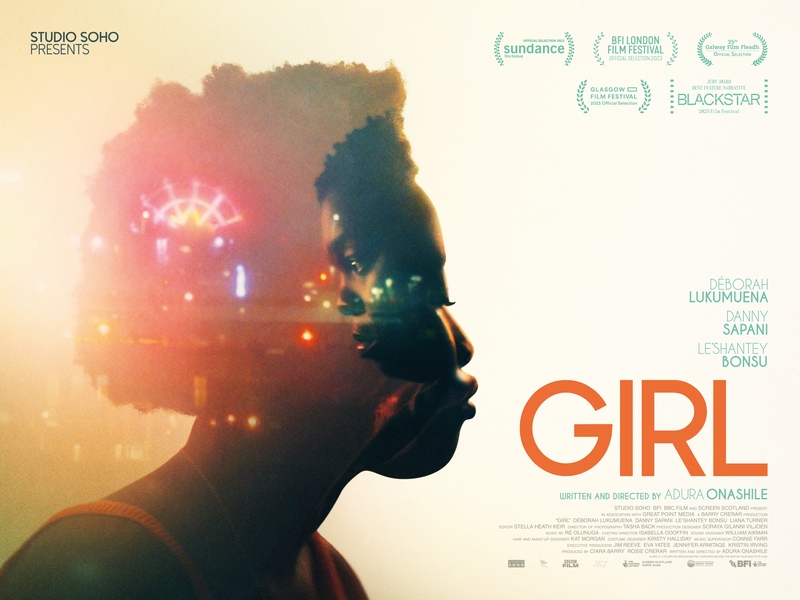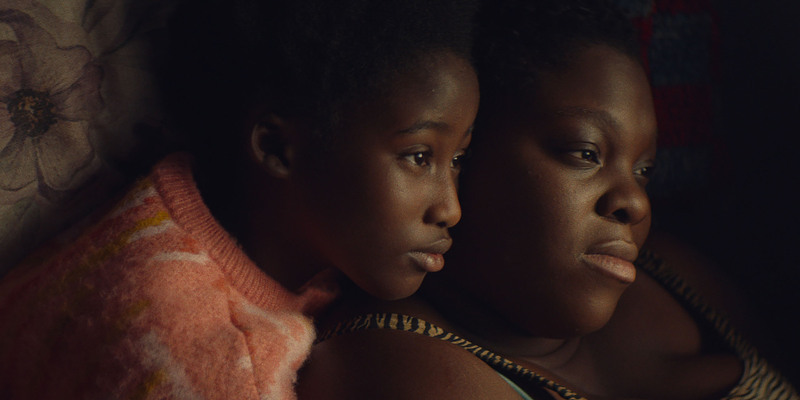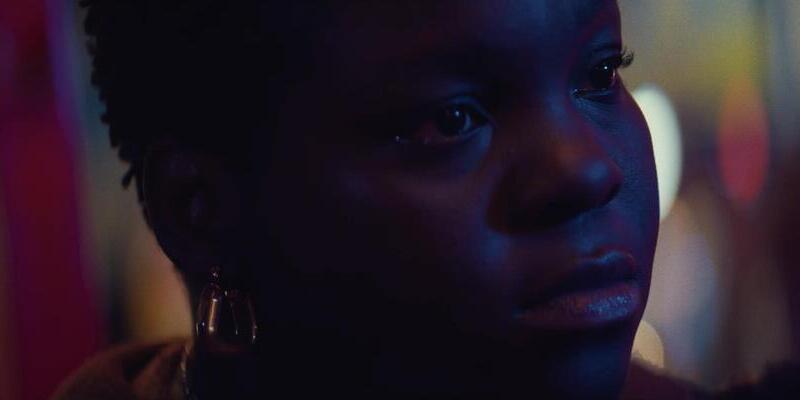
Review by
Blair MacBride
Directed by: Adura Onashile
Starring: Déborah Lukumuena, Danny Sapani, Le'Shantey Bonsu, Liana Turner

Highlighting an incredibly timely issue, this tale of an African mother
and daughter navigating their new life in Scotland is an intriguing
affair.
Adura Onashile's directorial feature debut is set in Glasgow. 25
year old Grace (Deborah Lukumuena) and her 11 year old "daughter"
Ama (Le'Shantay Bonsu) live on an aging council estate, having
moved from the country of their birth to escape an unidentified trauma.

Grace remains seriously troubled by the past throughout her restless days
and unsettled nights as a shopping centre cleaner. She evidently suffers
with PTSD from the disturbing events that have befallen her, to the point
where she is often left in a paralysed state both mentally and physically.
At the same time, having always previously been by Grace's side, Ama
begins to come of age in her new surroundings as she goes back to school
and makes friends with mischievous Fiona (Liana Turner). In turn,
Grace struggles to balance her existing mental health issues alongside new
found anxieties about Ama growing up. This creates a relentlessly unstable
home environment for them both, but more importantly, almost threatens the
pair's entire relationship.
It can't be denied that Girl has a lot going for it.
Onashile does a stellar job at crafting a really gripping narrative for a
feature debut, and her ability to have built such an engaging slow burner
is not only commendable, but it's also very gratifying to watch unfold.
Indeed, in the film's early stages, the pair's flat is the key location
and acts as a sanctuary, particularly for Grace. It is through Ama's view
of Glasgow, though, where we begin to see the notions of change emerge
between them.
While Grace likes to live as a near recluse, seeing the flat as a safe
haven where she can remain unbothered and unchallenged in her authority,
Ama uses the advantages of her new home in a different way. While her
"mother" is at work in the small hours of the morning, Ama uses a pair of
binoculars to scan her new surroundings and horizons on offer from the
balcony - cleverly indicating the different directions both are heading
in, and ergo their changing relationship. These picturesque shots over the
city also feature the luminous magic of Tasha Back's
cinematography. Often shown in cinema as a grainy, dark and gritty city,
Glasgow is given a colourful neon glow here and throughout, offering a
really warm alternative aesthetic.

In terms of performances, Lukumuena is wonderful in her portrayal of
Grace. She excels in her first English language speaking role, and
effortlessly captivates the audience with her depiction of the character's
growing paranoia and complex issues. Moreover, with the obvious sympathy
one feels for Grace to one side, we're left seething at her efforts to
continuously isolate her family-of-two and reject the help she's offered
to get on a stable footing; these emotions being largely and unequivocally
evoked as a result of Lukumuena's accomplished work. Other standouts
include novices Bonsu and Turner, with the former exceeding any
expectations, faultlessly portraying Ama's conflict of wanting to please
her "mother," but simultaneously seeking a perfectly natural adolescence
in her new city with the company of her new friend.
Regrettably, however, this feature's potentially memorable eminence
quickly unravels towards its final stages. From the get go, Onashile has a
clear intent to limit mentioning key aspects relating to her two
protagonists' story, leaving it up to the audience to draw their own
conclusions. Now, certain levels of ambiguity are understandable. To some
even, this may offer mystique and a certain allure. To others, though,
it's so blatantly irksome, let alone after an hour and 10 minutes laced
with sporadic flashbacks: there's absolutely no pay off. Had Onashile
avoided planting the seed of an obvious trauma which had transpired, it
would make far more sense - whatever came before mattered not, and
instead, we were to focus on the present. But making it a central part of
the character's story arc and ultimately leaving it in the end, properly
sticks in the craw. Additionally, on a technical issue, the last 15
minutes of the film are audio mixed awfully. In the closing scenes, it's
near impossible to make out what's being said, and at such a crucial
juncture, this has to be better.

That said, the biggest issue which takes the biscuit in
Girl is Grace's sudden change of heart. The realisation of
her own wrongdoing in closing off the rest of the world to Ama and herself
is perplexingly instantaneous. Squarely lying on the shoulders of Onashile
as both writer and director, the culmination of such early promise is
deflating, and isn't befitting of such a strong narrative. The viewer is
quite bizarrely left in the dark about what are made to feel like crucial
plot points.
Consequently, it has to be said that Girl adds a new layer
to the Scottish cinema scene by showcasing both a diversification of
stories, and their skilful tellers as well. Nevertheless, this really
gripping slow burner ends up falling short of its early promise.

Girl is in UK cinemas from November
24th.

